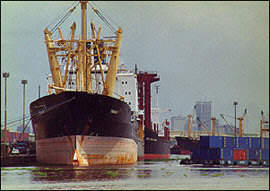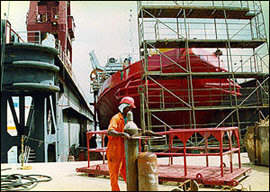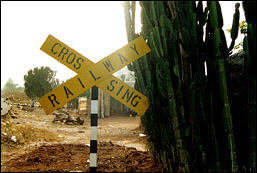 Transports Transports |
The transport sector is another crucial area of infrastructure provision that suffers considerable bottlenecks. Many parastatals involved in roads, railways, air and pipelines are at present not performing at optimal levels. There is an absence of integrated transport policy.
Different parastatals in this sector are being supervised by different ministries and agencies, such as works and housing, transport, aviation and NNPC leading to conflict of roles. However, the measures taken by the Ministry for the year 2000 bring new hopes for the sector.

Although some of these transport parastatals such as railways, airways, inland waterways, ports and maritime, are expected to generate revenue for their sustenance, they are now solely dependent on the government. Furthermore, most of these parastatals are in advanced stages of disrepair. The federal urban mass transit programme was set up to revive road transport and assuage commuters' hardship. To develop water transportation, the National Inland Waterways Authority was set up.
The maritime industry is said to be Nigeria's second largest sector after the oil sector. The national shipping policy seeks to improve Nigeria's balance of payments by enhancing earnings and conserving foreign exchange in the shipping industry as well as promoting export trade. The National Maritime Authority has conferred National carrier status on a number of privately-owned shipping lines.
The shipping policy seeks to promote the acquisition of shipping technology as well as to create and diversify employment opportunities in the shipping industry. The government wants to utilise the administration of the entire transport chain to enhance intra-West African trade.

Nigerdock, established in 1986 in partnership with Navimor of Poland, is also actively contributing to the evolution of the maritime sector. Nigerdock has repaired 367 vessels and oil tankers. With one of the best drydock facilities in the world it has since become a full-fledged ship building and off-shore construction yard. It thus serves both the shipping and the oil industry. |
Mr. Nnamdi Ozobia, the chief executive aims to see Nigerdock in the deep offshore where Nigeria's oil industry is headed. For this, he is entering into joint ventures with a number of foreign companies.
Mr. Sarumi, the Managing Director of Nigerian Shippers Council, responsible for ensuring the shipment of shippers' goods, says there are investment opportunities in the area of ports terminals operations, especially with the steps taken by the Transport Ministry to speed-up port operations: In January 2000, Dr. Kema Chikwe ordered that cargo clearing and delivery process at all seaports in the country should be streamlined. This is to ensure compliance with the 48-hour turnaround time for vessels as recommended by the International Maritime organisation (IMO). The Minister directed that all the tables along the clearing and delivery lines be reduced to one. Besides, this will enhance the anti-corruption stance of the Obasanjo administration. According to Dr. Chikwe "one had to offer bribe at each table in order to receive attention". From now, clearing agents will just need to submit their documents to the release table.
Another awaited improvement concerns the exemption of pre-shipment inspection which is as a significant impediment to trade. The Central Bank released in January 2000 the list of goods exempted from pre-shipment inspection. The goods concerned are "used motor vehicles" used for transportation of goods and persons and perishable goods such as live animals, human organs, vaccines, yeast, periodical/magazines and fresh fruits and vegetables. Authorized dealers have been asked to promptly comply with those new measures.

However, in order to get an optimal efficiency within the whole chain of the transport sector, improvements in maritime services will needs to be completed on the ground with the furnishing and modernisation of the railway network. According to Mr. Sarumi of Nigerian Shipppers' Council, "Today, the rail carries less than 0.05% of the freight that is moved within Nigeria. The reason is that the tracks are obsolete and the rail lines do not form an efficient network". Indians and Chinese have at different times been contracted to resuscitate the railways to little avail. Even so, the Transport Minister, Dr. (Mrs) Kema Chikwe, says it is inviting private sector participation in its renewed bid to reconstruct and expand the railways system. Extension of rail lines is Dr. Chikwe's top priority.
The railways parastatal, the Nigerian Railways Corporation, will get 55% (US$ 15 million) of the total capital expenditure of the transport ministry in 2000.
As for the aviation sector, it has long been fully deregulated such that over a dozen local private airlines dominate the domestic route leaving the national carrier almost grounded.
Aviation and banking taught Nigerians the beauty of privatisation and deregulation. Nigerians who used to struggle for a seat space in Nigeria Airways now don't notice it if the airline doesn't fly for a whole year. The industry has remained vibrant welcoming new entrants even as it sees off non-performers. Airline business was once thought here to be a preserve of government. Time and tide have changed such misperceptions. The government of the day is engendering accelerated paradigm shift in the core infrastructure sectors of the Nigerian economy. |

